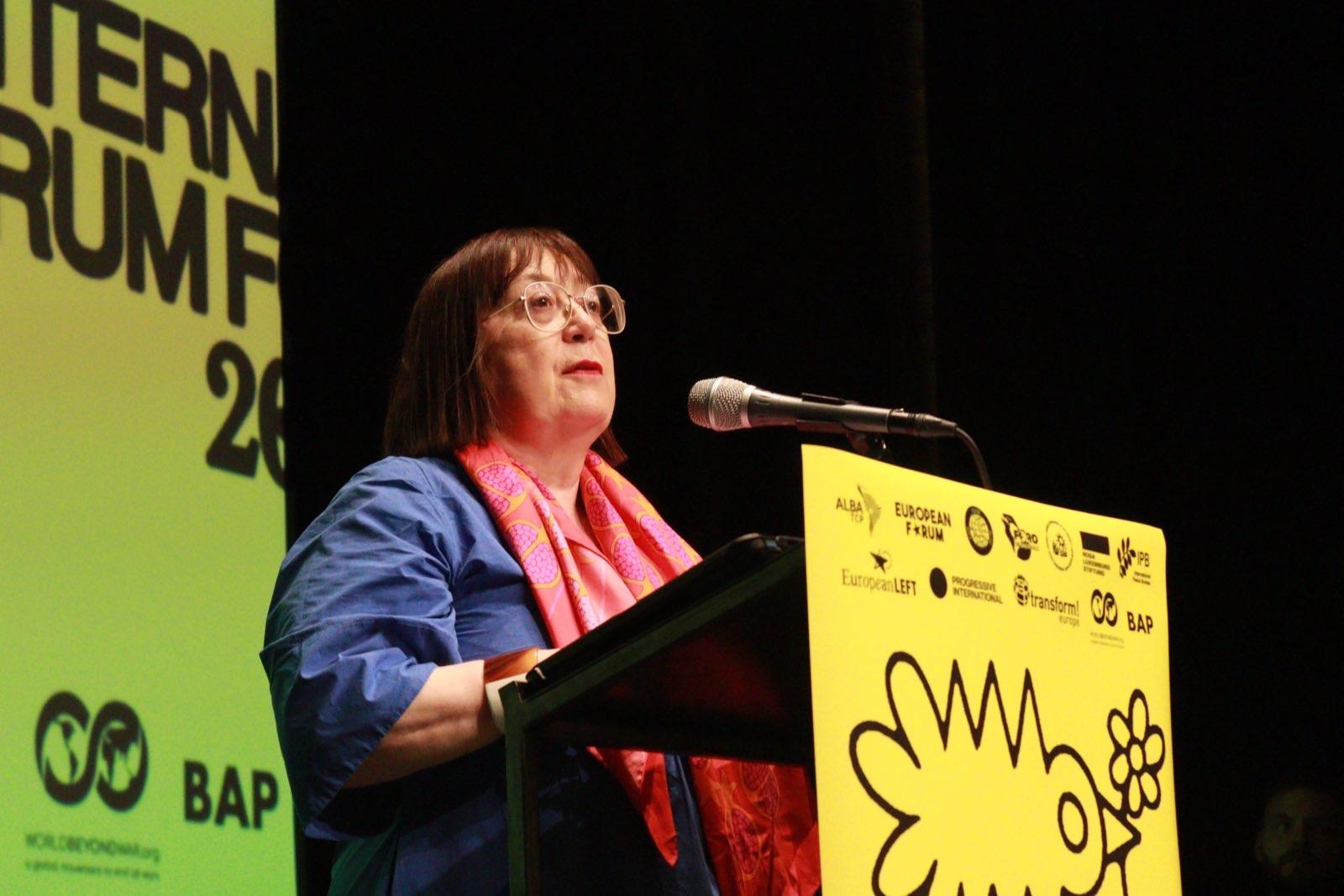
Esther Lynch, ETUC General Secretary, spoke at the International Forum for Peace 2025, marking exactly fifty years since the signing of the Helsinki Accords. This is the speech she delivered:
Colleagues, Friends in Peace,
It is an honour to speak with you today at the International Forum for Peace 2025. I’m here not only as a representative of Europe’s trade union movement, but as part of a global family committed to social justice, dignity, and peace for all working people.
Today, we are here because the world is at a crossroads. War, authoritarianism, environmental collapse, economic inequality, and the erosion of democratic norms are converging to threaten the very idea of peace as we know it. In every one of these crises, it is working people — our sisters and brothers — who suffer the most. Whether in Ukraine or Gaza, workers pay the price of war with their lives, shattered communities, and stolen futures.
Our demand: common security. And so we ask: What is peace?
Peace is not merely the silence of guns. It is not the absence of violence. Peace is the presence of social justice. It is the presence of rights. It is the ability to live free of fear, with dignity, with security — and with a voice.
As trade unionists, these are the very values we defend. Not just in boardrooms, not just in workplaces, but in war zones, in refugee camps, in parliaments, and in the streets. Our movement — often invisible, but always resilient — has played an essential role in peacebuilding across continents and generations.
And that is why the ETUC launched a Trade Unions for Peace initiative — a new, affiliates-led action that builds on the foundations of solidarity, dialogue, and social justice. An initiative that says clearly: we are not just negotiators — we are peacebuilders.
‘’Why Trade Unions?’’ you may ask, what role do trade unions have in the pursuit of peace?
Our answer is simple. Because peace without social justice is unsustainable. Because democracy without decent work is fragile. And because reconstruction without workers’ voices will always fail.
We know from history — from South Africa to Northern Ireland, from Colombia to the Balkans — that trade unions have helped bridge divides, supported peace accords, and played vital roles in national reconciliation. We fight for jobs, yes — but we also fight for inclusion, cohesion, and human dignity.
We bring people together across ethnic, religious, and political lines. We promote negotiation over violence, dialogue over division, and hope over hate. And we know that when public services are strong, when work is decent, when rights are respected — conflict is less likely to take root.
We are proud that Trade Unions for Peace begins with principles — not positions. Our affiliates do not always agree on every geopolitical matter, and that’s okay. But we are united in believing that peace must be based on:
- Social justice and inclusion,
- Respect for human and labour rights,
- Multilateralism and international law,
- And a rebalancing of resources from militarisation to meaningful public investment.
We reject the idea that Europe’s future must be built only on military preparedness. The EU has a security and defence policy — yes. But where is the peace policy? Where is the investment in diplomacy, in reconstruction, in dialogue?
There must also be a European peace narrative — and trade unions must help shape it.
The Trade Unions for Peace initiative is not just words — it is action. It is grounded in clear, practical goals:
- Defending the right to organise in fragile and conflict-affected states — because voice and representation are essential to stability.
- Promoting trade union involvement in conflict prevention and mitigation — through local organising, international solidarity, and advocacy.
- Strengthening early warning capacity so that unions can act before crises escalate.
- Equipping unions to take part in emergency response while respecting local dynamics and sensitivities.
- Supporting long-term recovery, so that reconstruction creates good jobs, rebuilds lives, and empowers communities.
- Building resilience, making unions central actors in sustaining peace and democratic transition.
To support trade unions in these endeavours, we will be putting together a Toolkit with case studies and digital resources and network of Peace Work Ambassadors to mentor and mobilise trade unionists; and will be holding a Forum every year from this autumn.
And we will set up a European Peace Centre to coordinate union engagement in peace processes, reconstruction, and inclusive development across our continent and beyond.
To do this, we need more than declarations. We need partners. We need recognition. We need action.
Thus we call on governments and international institutions to recognise trade unions as essential actors in peacebuilding and reconstruction.
We demand that social conditionalities be applied to all public investment in conflict zones — especially in reconstruction processes like Ukraine and eventually in, Gaza.
We urge the EU to develop a peace policy that prioritises diplomacy, development, and social cohesion, not just defence spending.
And we ask every union, every affiliate, every activist: join us. Bring your experience. Share your leadership. Help us build a movement that turns solidarity into peace.
Friends, let me end with this: Peace is not a luxury. It is a right. And it is a responsibility.
In a world torn by war and disinformation, by inequality and exploitation, trade unions are beacons of trust. We are rooted in the real — in workplaces, in communities, in people’s everyday struggles. That is our strength. And that is our power.
We are here because we believe another world is possible — a world where peace is built from the ground up, where workers are not collateral damage but agents of change, and where dialogue defeats division.
Let us leave this Forum not only inspired, but organised.
Let us show that solidarity is our strategy, dialogue is our tool, and peace is our mission.
Thank you.
